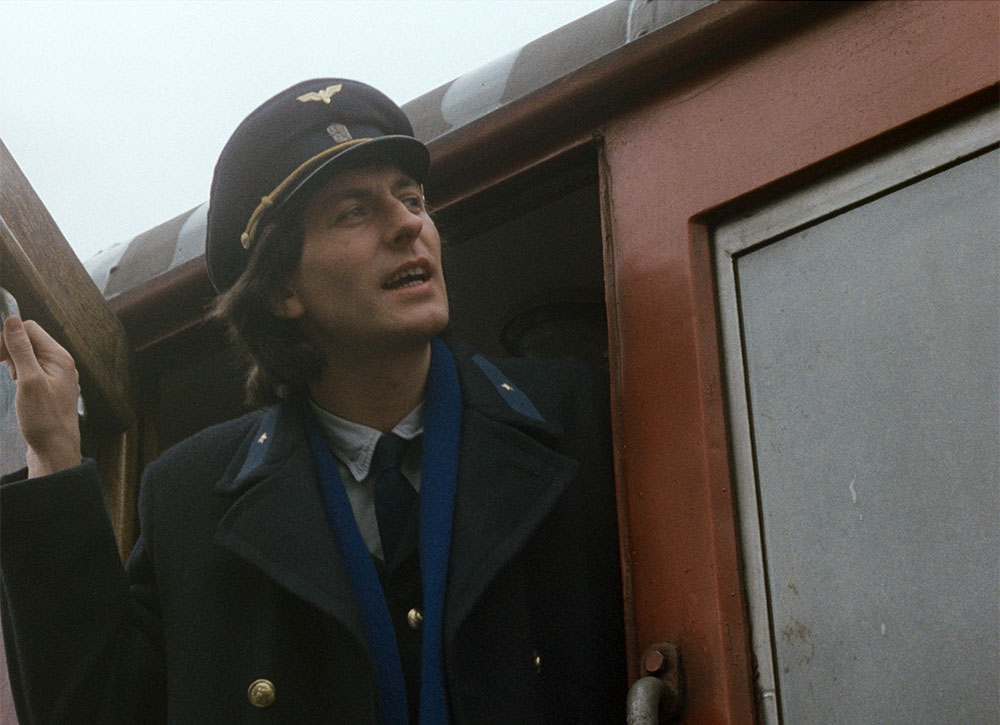The word calamity suggests a singular, shocking event, but in Věra Chytilová’s so-named 1982 comedy, calamities are neither. They are banal, routine—“the new normal,” in common parlance. Or, perhaps, “normalized,” denoting a period from the 1968 Warsaw Pact invasion to glasnost when Chytilová’s native Czechoslovakia reasserted its Soviet-backed status quo. Purges, crackdowns, arrests descended, and lingered, like weather—a drift that softly accrues until, near the end of Chytilová’s film, it envelops everything.
So what is the calamity for Honza Dostál (Bolek Polívka), returning home à la prodigal son to his widowed father (who runs a trackside pub, as did Chytilová’s own)? “My payday isn’t until the day after tomorrow.” Honza has dropped out of college to work as a train driver, though he spends much of his time pursuing or fending off women: a railway colleague, a doctor trailed by her husband, and a bobsledder collecting “experience” to give her a competitive edge. Everything else, he says, seems “pointless”—a word evoked, in its various forms, throughout the film, like a nagging, unconvinced nihilism. “Why would you invest in it without feeling anything?” Honza asks one of his potential lovers, who seems to see sex as a competition and “libido” as a one-size-fits-all product, manufactured via assembly line. “What’s the point?”
But if Honza hopes to literalize his existential crisis—by traveling from point A to point B—he’s out of luck. The railway system, like the society around it, is mired in confusion. No one wants to take responsibility for anything. A running gag in the film involves characters saying “I’ll have to answer for it!” before passing the blame to others. Even before his job interview, Honza gets trapped inside the information room when the door handle detaches; when the interviewer asks which room, Honza says he can’t make sense of something from the inside. (This scenario recurs in 1979’s Prefab Story, shot when Polívka was poached for another film and Calamity, appropriately, stalled.) A mixed cast of professionals and nons, and the jazz-funk score—composer-trumpeter Laco Déczi appears in the film as Honza’s “chick”-obsessed roommate—add to the chaotic atmosphere.
Railway workers “used to command so much respect,” declares Honza’s father; his job interviewer, stressing punctuality, points out that people once set their watches by trains, but Honza has only seen that in a film. The film he is probably thinking of is Jiří Menzel’s Closely Watched Trains, which won the Foreign-Language Oscar months before the 1968 invasion. Gone is the quaint bumbling of that sleepy depot, where the bug-eyed virginal trainee is crowned in slow motion with a uniform cap that guarantees at least a livable pension in his waning years. In that film, donning one’s cap is a ceremony of honor; in Chytilová’s, Honza slaps it on his head as a “chick magnet.” (Though here, nothing “official” is trusted.) If Trains’s protagonist manages to redeem his pathetic impotence/inexperience by a sacrificial act of real resistance, what was the use if this is the world his successors have inherited?
Many times the characters seem to be discussing, in a sideways fashion, Chytilová and her fellow New Wavers, who were thwarted by financial woes, state censorship boards, and emigration. Earlier, Honza is asked to identify a signal color but hesitates; he knows the authorities anticipate a precise answer, but he sees not only red but carmine, scarlet, crimson. “Are you a painter or what,” asks his examiner. Well, no, he replies—he didn’t see a “point” to it, in a world where everything is instrumentalized, answers must be known before questions, and everything put to a fixed purpose. In another scene, a lumberjack explains to Honza that infested timber caused his colleagues to defect: “It’s demoralizing when your work is hopeless.”
The scholar Peter Hames once called Calamity a “disappointment.” (Narodni filmovy archiv, a bit kinder, says “provocatively unpolished.” In fact, at one point, during yet another failed sexual encounter, Honza exclaims at the camera, “This is so amateurish!” This scene, like many others, was improvised to get around the censors, who had already demanded many changes to the script Chytilová co-wrote. It didn’t work—the film, which Barrandov Studios only released to recoup its losses, was seen widely and then promptly banned in Prague.) But disappointment is its métier. Here, sex is a competition; “libido” is one size fits all, as if made via assembly line; and dating, at least from the man’s perspective, a way of auditioning potential housekeepers. Here is a sex comedy whose protagonist doesn’t get any, or anywhere.
That is, until the climax. Honza finally moves forward, with a catch: one car becomes two; a coronary care unit—a burdening heart—trails behind. Too encumbered to escape, his train stalls under mounds of snow, the unheeded accumulations finally bursting forth. But even this calamity, once it arrives, seems only to extend the previous disorder. The reactions of the passengers—including, conveniently, his three potential lovers—are magnified versions of their behavior elsewhere. One woman makes off with the sole set of skis—interestingly, the actress also escaped, that is, emigrated, after filming—and Honza scoffs: she “probably thinks she’s won.” He doesn’t seem to find value in escape. And after all, Chytilová didn’t escape to Hollywood, like Miloš Forman; like Menzel, she remained in Prague, mothering and making films whenever she could. In the end, people cooperate outside official procedure, and the children emerge first, running toward the woods. Maybe they’ll start something new or maybe, like Hansel and Gretel, the best they can hope for is to survive whatever calamities the future holds.
Calamity screens this evening, January 10, and January 14, at the Museum of Modern as part of the series “To Save and Project.”



